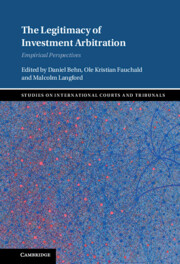Book contents
- The Legitimacy of Investment Arbitration
- Studies on International Courts and Tribunals
- The Legitimacy of Investment Arbitration
- Copyright page
- Contents
- Figures
- Tables
- Contributors
- 1 Introduction: The Legitimacy Crisis and the Empirical Turn
- 2 The International Investment Regime and Its Discontents
- Part I Process Legitimacy
- 3 Testing Cognitive Bias: Experimental Approaches and Investment Arbitration
- 4 The Influence of Law Firms in Investment Arbitration
- 5 Arbitrator Challenges in International Investment Tribunals
- 6 Dissents in Investment Arbitration: On Collegiality and Individualism
- Part II Process Legitimacy
- Part III Output Legitimacy
- Part IV Legitimation Strategies
- Index
5 - Arbitrator Challenges in International Investment Tribunals
from Part I - Process Legitimacy
Published online by Cambridge University Press: 06 January 2022
- The Legitimacy of Investment Arbitration
- Studies on International Courts and Tribunals
- The Legitimacy of Investment Arbitration
- Copyright page
- Contents
- Figures
- Tables
- Contributors
- 1 Introduction: The Legitimacy Crisis and the Empirical Turn
- 2 The International Investment Regime and Its Discontents
- Part I Process Legitimacy
- 3 Testing Cognitive Bias: Experimental Approaches and Investment Arbitration
- 4 The Influence of Law Firms in Investment Arbitration
- 5 Arbitrator Challenges in International Investment Tribunals
- 6 Dissents in Investment Arbitration: On Collegiality and Individualism
- Part II Process Legitimacy
- Part III Output Legitimacy
- Part IV Legitimation Strategies
- Index
Summary
This chapter provides an account of ways that experimental methods can be used to uncover and identify decision-making biases. Investment arbitration tribunals derive their legitimacy from different normative, sociological and political processes than standing courts. In great part, these tribunals rely on tacit norms of behaviour among arbitration professionals. Understanding what factors affect how arbitrators make decisions in these kinds of adjudicative settings is essential in assessing critiques concerning the quality or correctness of their decisions and especially their independence and impartiality. The authors describe a promising alternative empirical strategy that utilizes survey experiments conducted on arbitration professionals to test bias claims. It discusses also how researchers can design experimental vignettes to mimic specific aspects of the arbitration process that are difficult to observe or manipulate in the real world context.
Keywords
- Type
- Chapter
- Information
- The Legitimacy of Investment ArbitrationEmpirical Perspectives, pp. 133 - 158Publisher: Cambridge University PressPrint publication year: 2022



